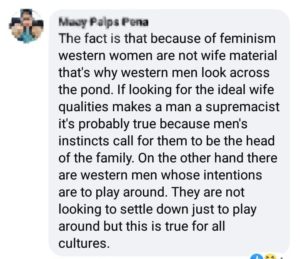A Canadian-Filipino journalist faced backlash online late last month after she linked Derek Chauvin, the Minneapolis cop caught on camera killing African American George Floyd, to white supremacists and terrorists who had married Asian women.
In a now-deleted Facebook post, feminist writer Charlene Sayo wrote that many are surprised that Chauvin is married to a Lao woman named Kellie Chauvin.
“I’m not surprised that a white supremacist married a woman of colour— after all, the Las Vegas shooter and the Oklahoma bomber married Filipino women,” Sayo said.
Sayo is referring to Marilou Danley, former girlfriend of Stephen Paddock, the shooter who killed 58 people in Las Vegas in 2018; and Lana Padilla, the ex-wife of Terry Nichols, an accomplice in the 1995 Oklahoma City bombing.
It’s important to note that there’s been no evidence released connecting Chauvin or Paddock to white supremacism, but there is a well-documented trend of white supremacists dating Asian women.
Years ago, Sayo said that she published a research project with the Philippine Women’s Centre in British Columbia about Filipino mail-order brides in Canada.
“We interviewed over 30 Filipino Mail-Order-Brides AND their white husbands: white men who actively looked for and married Filipino women BECAUSE of their racist beliefs that Filipino women are subservient, submissive, family-oriented, domesticated, old-fashioned, and obedient,” Sayo wrote. She added that the men avoided marrying Western women because they were too free and independent (or so these men believed).
Her post quickly went viral. While some thought Sayo’s research was interesting, many were offended by how she painted interracial relationships, including Western men married to Asian women, who said that their wives were far from being subservient.
Others thought there was nothing wrong if a white man married a docile Asian female, such as this woman, who wrote, “The fact is that because of feminism western women are not wife material that’s why western men look across the pond. If looking for the ideal wife qualities makes a man a supremacist it’s probably true because men’s instincts call for them to be the head of the family.”

Sayo ended up erasing her viral post because people have threatened her with violence, and even rape. However, Coconuts Manila interviewed her via email to know more about her research, which was conducted years ago but proves relevant to this day.
When was your research done and what led you to pursue this topic?
The Philippine Women Centre of BC (PWC)–of which I was a member of, and later became the former Executive Director–completed the project, “Canada: The New Frontier for Filipino Mail-Order Brides” in 2000.
We became interested in looking at the Filipino Mail-Order Bride (MOB) phenomenon in Canada after learning from our broad membership that there was a trend among mostly white Canadian men of a certain class either flying to the Philippines and actively looking for a wife, or they were pursuing relationships specifically with Filipino nannies and domestic workers in Canada.
Before all of this, the PWC spent 20 years researching, interviewing, and writing numerous reports about the migration of Filipino domestic workers and nannies to Canada. Our research found that the rise of MOB’s in Canada was tied to Canada’s immigration policies of recruiting Filipino domestic workers. After almost 40 years of recruiting Filipino domestic workers and nannies, the social identity of Filipinas in Canada was based on the stereotype that Filipino women are submissive, family-oriented, docile, old-fashioned, and make great home-makers. These stereotypes encouraged the husbands we interviewed to specifically look for, and marry Filipino women.
We also found in our research that the women were coerced by their families to marry foreign men for the same reason that Filipino women work abroad: that whatever money they could get, even a small allowance from their husbands, mail-order brides would send back to their families in the Philippines.
Read: Survey shows many Filipino women won’t date someone much younger
The women whom you met during the course of your research: were they abused by their husbands? Did they try to leave their relationships?
Most of the women we interviewed were not physically abused, however, they were generally isolated in smaller, rural communities, away from resources and support such as family, community centers, or women’s organizations–most of the women had no family in Canada. Most of the women did not work either because their husbands did not allow them, or they had to stay at home to take care of the children and the household. They were all financially dependent on their husbands, and their immigrant status was tied to their husbands as well.
“Priscilla” (name changed to protect her identity), one of the women we worked with on the project, was instrumental in introducing us to MOBs. She was in the midst of trying to escape her physically abusive marriage while we were working on the project. Priscilla had filed for divorce from her Canadian husband and was fighting for custody of her Canadian born daughter, who was about 6 years old at the time. She was also fighting against deportation orders, which her husband had threatened her with, when she tried to leave the marriage the first time. Priscilla ended up losing custody of her daughter and was deported to the Philippines, even though the PWC had advocated, along with her legal team, that she must stay in Canada as it was cruel to separate a mother from her daughter.
One of the women we interviewed, “Lucy” knew what her marriage was about: that her husband found her in the Philippines, married her, and brought her to Canada to stay at home, cook, clean, and raise their son. To augment the allowance her husband gave her, Lucy baby-sat a child nearby while her husband was at work, since he didn’t allow her to have a job. Since the day he was born, Lucy only spoke to her son in Filipino since she wanted to be able to communicate with him in a language that her husband couldn’t understand–Lucy was hoping that when her son comes of age, that he’d help her escape her husband. Lucy’s story, and the other stories of the women we interviewed, have stuck with me after all these years.
What led you to write about Kellie Chauvin on Facebook?
I wasn’t interested in writing about Kellie Chauvin. I was more interested in bringing up just one of the many reasons why violently racist–even white supremacist–men would marry women of colour. After all, if racists have a general hatred towards people of colour and immigrants, how is it that they can marry women of colour, specifically?
The Oklahoma Bomber and the Las Vegas shooter were married to Asian women, and the American killer, Jack Reeves, killed three of his four ex-wives. Two of his ex-wives were Asian Mail-Order Brides. It became clear to me that the husbands I met and interviewed for the MOB project, while they were not white supremacists, had the same racist and misogynist views that violent, white supremacists had, although to varying degrees. These men believe that women of colour are more submissive, obedient, and easier to isolate and control, than say, white women or women who were born in Western Countries such as Canada and the United States. As I had written on my Facebook post, the husbands I met and interviewed, did not want to marry white women as they believed that white women were “too free and independent” and often talked back. They were all looking for a particular type of woman that would serve them unconditionally and not fight back.
These types of marriages are not based on love, companionship, and equality. To me, they are expressions and practices of hierarchy, domination, racism, and misogyny, and they differ greatly from genuinely loving, and fulfilling interracial relationships and marriages.
The post went viral and was even circulated on Twitter–even though I’m not on Twitter–and on Instagram. I did not expect it to go viral at all.
What was your reaction with the comments on your post?
There were 600 comments alone on Facebook and who knows how many more on Twitter and Instagram. The comments ranged from intelligent observations, many agreed with me; many more were curious about the topic; many folks accused me of lying, and called me racist; a lot were full of vitriol; and many, many, people absolutely hated my post.
Despite all the different responses, it was pretty clear that the reason why the post went viral is that it had to do with Filipino women and sex. To be more specific, it had everything to do with male sexual entitlement and access to Filipino women’s bodies and its connection to white supremacy, and in particular, to George Floyd’s killer.
Is it true that you received threats? What can you say about this?
I started receiving violently racist rape threats on the public posts of my Facebook wall. Trolls were not just commenting on the MOB post, but were scrolling down and commenting and swearing on whatever public post they could access on my wall. I had to change my profile name on Facebook and Instagram, and raised the security and privacy on my online profiles and activities. The racist comments I could almost ignore, the rape threats I could not.
The threats were misogynist and racist in nature and the trolls who posted them knew the gravity and danger of the threats. Very violent men wield rape threats against women as they know that rape, apart from murder, is the worst thing you can do to a woman. That the threats were racist added another dimension to dominate and eviscerate me as a woman of colour and my words. These trolls were triggered, and, based on their threats, truly believe that all women should be silenced and dominated.
Read: Stuck in traffic: How Manila’s roads are making love elusive for Filipinos
Are there still Filipina mail-order brides in Canada? Are they different from the ones who came before them?
I believe that Filipino mail-order brides continue to migrate to Canada and around the world. Since Canada doesn’t have an overt mail-order bride industry in the way that Germany, the United States, and Australia do, I believe that Canadian men meet Filipino women online or, they simply fly to the Philippines and search for a wife over there. But that’s for another research project, and the pandemic is certainly impacting international travel at the moment.
Editor’s Note: We have changed the headline on this story and added context to Sayo’s claims in the introduction.




